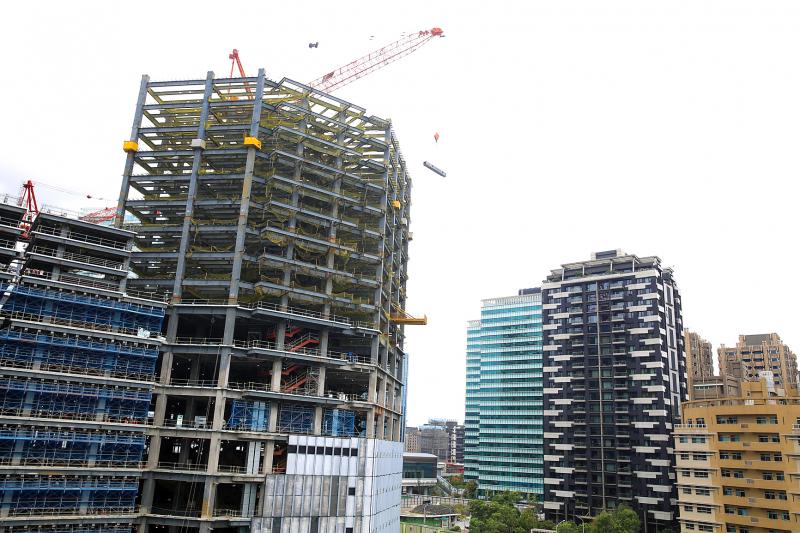Major Taiwanese developers and brokers are poised to launch new housing projects in the coming spring sales season to take advantage of the nation’s robust economy and a real-estate boom.
Taiwan’s two largest housing agencies, JSL Construction & Development Co (愛山林) and Hiyes International Co (海悅國際開發), said they have NT$110 billion (US$3.95 billion) and NT$80 billion worth of projects on hand for the season with starting dates next month and April.
The sales strategy reflects positive sentiment on the supply side, encouraged by last year’s strong growth in GDP of 6.28 percent, and could continue to expand by more than 4 percent this year.

Photo: I-Hwa Cheng/Bloomberg
Hiyes is to put on the market an urban renewal project called Diamond Towers on Zhongxiao E Road with NT$45 billion in sales, the third development of Grant Manor in New Taipei City’s Tucheng District at NT$15 billion and another urban renewal project in Kaohsiung at NT$14 billion.
JSL said its projects would include residential complexes in New Taipei City’s Tamsui (淡水), Sanchong (三重) and Sijhih (汐止) districts, as well as in Keelung and Hsinchu County.
Farglory Land Development Co (遠雄建設) said it would proceed with the project “Park One” in New Taipei City’s Jhonghe District (中和), which could generate NT$5 billion in sales. Its brokerage subsidiary plans to launch projects in Taoyuan.
My Housing Monthly head researcher Ho Chih-chang (何世昌) said that the market would likely be busy in the spring and summer, as developers would slow their pace thereafter as the year-end elections of local administrators and councilors draw near, creating policy uncertainty.
Developers could set high prices for their projects, citing rising building material and labor costs, Ho said, adding that the moves would surely draw attention from policymakers.
Creator Marketing Co (創意家) said that it has projects for sale in Taipei’s Neihu District (內湖) and Dazhi area (大直), New Taipei City’s Sanchong District, Taichung and other parts of Taiwan.

Sweeping policy changes under US Secretary of Health and Human Services Robert F. Kennedy Jr are having a chilling effect on vaccine makers as anti-vaccine rhetoric has turned into concrete changes in inoculation schedules and recommendations, investors and executives said. The administration of US President Donald Trump has in the past year upended vaccine recommendations, with the country last month ending its longstanding guidance that all children receive inoculations against flu, hepatitis A and other diseases. The unprecedented changes have led to diminished vaccine usage, hurt the investment case for some biotechs, and created a drag that would likely dent revenues and

Global semiconductor stocks advanced yesterday, as comments by Nvidia Corp chief executive officer Jensen Huang (黃仁勳) at Davos, Switzerland, helped reinforce investor enthusiasm for artificial intelligence (AI). Samsung Electronics Co gained as much as 5 percent to an all-time high, helping drive South Korea’s benchmark KOSPI above 5,000 for the first time. That came after the Philadelphia Semiconductor Index rose more than 3 percent to a fresh record on Wednesday, with a boost from Nvidia. The gains came amid broad risk-on trade after US President Donald Trump withdrew his threat of tariffs on some European nations over backing for Greenland. Huang further

CULPRITS: Factors that affected the slip included falling global crude oil prices, wait-and-see consumer attitudes due to US tariffs and a different Lunar New Year holiday schedule Taiwan’s retail sales ended a nine-year growth streak last year, slipping 0.2 percent from a year earlier as uncertainty over US tariff policies affected demand for durable goods, data released on Friday by the Ministry of Economic Affairs showed. Last year’s retail sales totaled NT$4.84 trillion (US$153.27 billion), down about NT$9.5 billion, or 0.2 percent, from 2024. Despite the decline, the figure was still the second-highest annual sales total on record. Ministry statistics department deputy head Chen Yu-fang (陳玉芳) said sales of cars, motorcycles and related products, which accounted for 17.4 percent of total retail rales last year, fell NT$68.1 billion, or

Macronix International Co (旺宏), the world’s biggest NOR flash memory supplier, yesterday said it would spend NT$22 billion (US$699.1 million) on capacity expansion this year to increase its production of mid-to-low-density memory chips as the world’s major memorychip suppliers are phasing out the market. The company said its planned capital expenditures are about 11 times higher than the NT$1.8 billion it spent on new facilities and equipment last year. A majority of this year’s outlay would be allocated to step up capacity of multi-level cell (MLC) NAND flash memory chips, which are used in embedded multimedia cards (eMMC), a managed